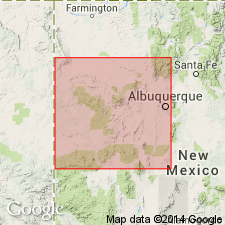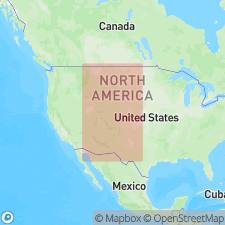
- Usage in publication:
-
- Clay Mesa Shale Tongue*
- Modifications:
-
- Named
- Dominant lithology:
-
- Shale
- Bentonite
- AAPG geologic province:
-
- San Juan basin
Summary:
Named as one of two tongues of the Upper Cretaceous Mancos Shale for exposures on east and south side of Clay Mesa, about 3 mi northwest of Laguna in San Juan basin. Type section measured at NE1/4 SE1/4 sec 20 and SW1/4 NW1/4 sec 21, T10N, R5W, Laguna quad. Is composed mostly of medium- to dark-gray clay shale, silty in part, but in lower part has bentonites, limy concretions, and thin limestone beds. Upper part includes sandy beds and is siltier than rest of tongue. Is 69 ft thick at type where it overlies Cubero Sandstone Tongue of Dakota Sandstone and underlies Paguate Tongue of Dakota. Wedges out in main body of Dakota between Grants and Mount Powell areas. Is equivalent to lower part of Mancos in Alamo, Alamo Day School, and the Narrows area. Is fossiliferous. Deposited in quiet marine water.
Source: GNU records (USGS DDS-6; Denver GNULEX).

- Usage in publication:
-
- Clay Mesa Tongue*
- Modifications:
-
- Biostratigraphic dating
- AAPG geologic province:
-
- San Juan basin
Summary:
Is a tongue of Mancos Shale. Is assigned a late middle Cenomanian (Late Cretaceous) age based on identification of the ammonite TARRANTOCERAS SELLARDSI in limestone concretions from USGS Mesozoic locality D5380 in Sandoval Co, NM in San Juan basin. Fauna places unit in CUNNINGTONICERAS AMPHIBOLUM AMPHIBOLUM subzone of C. AMPHIBOLUM zone. [Term "shale" considered redundant, and dropped from formal name.]
Source: GNU records (USGS DDS-6; Denver GNULEX).
For more information, please contact Nancy Stamm, Geologic Names Committee Secretary.
Asterisk (*) indicates published by U.S. Geological Survey authors.
"No current usage" (†) implies that a name has been abandoned or has fallen into disuse. Former usage and, if known, replacement name given in parentheses ( ).
Slash (/) indicates name conflicts with nomenclatural guidelines (CSN, 1933; ACSN, 1961, 1970; NACSN, 1983, 2005, 2021). May be explained within brackets ([ ]).

